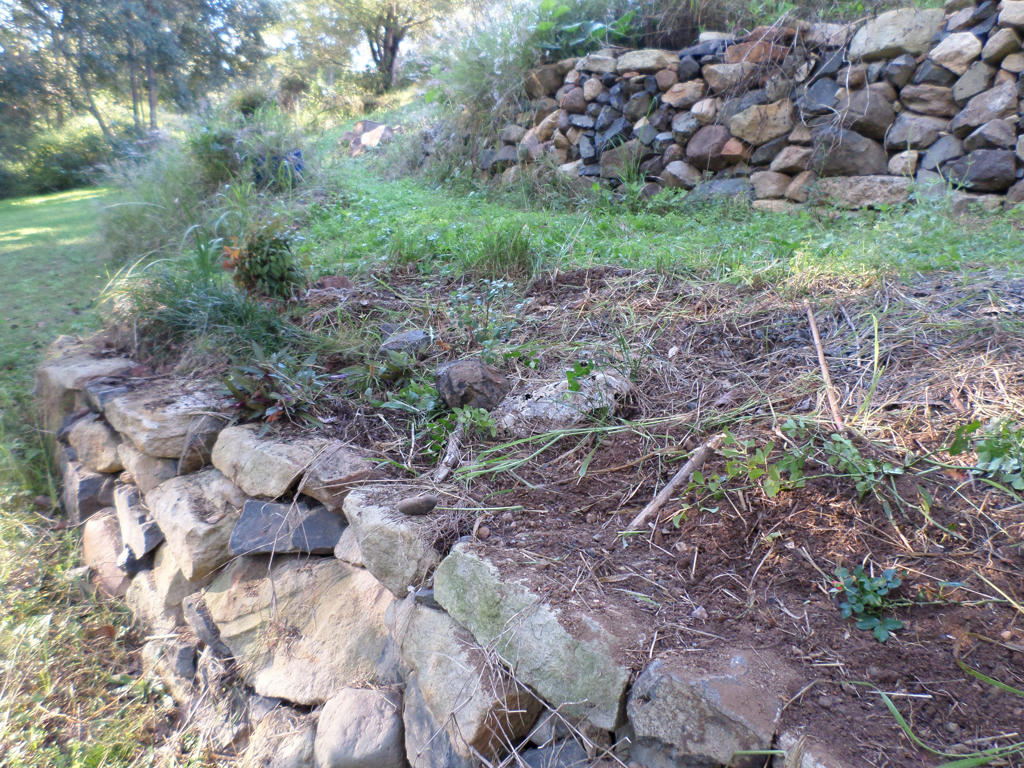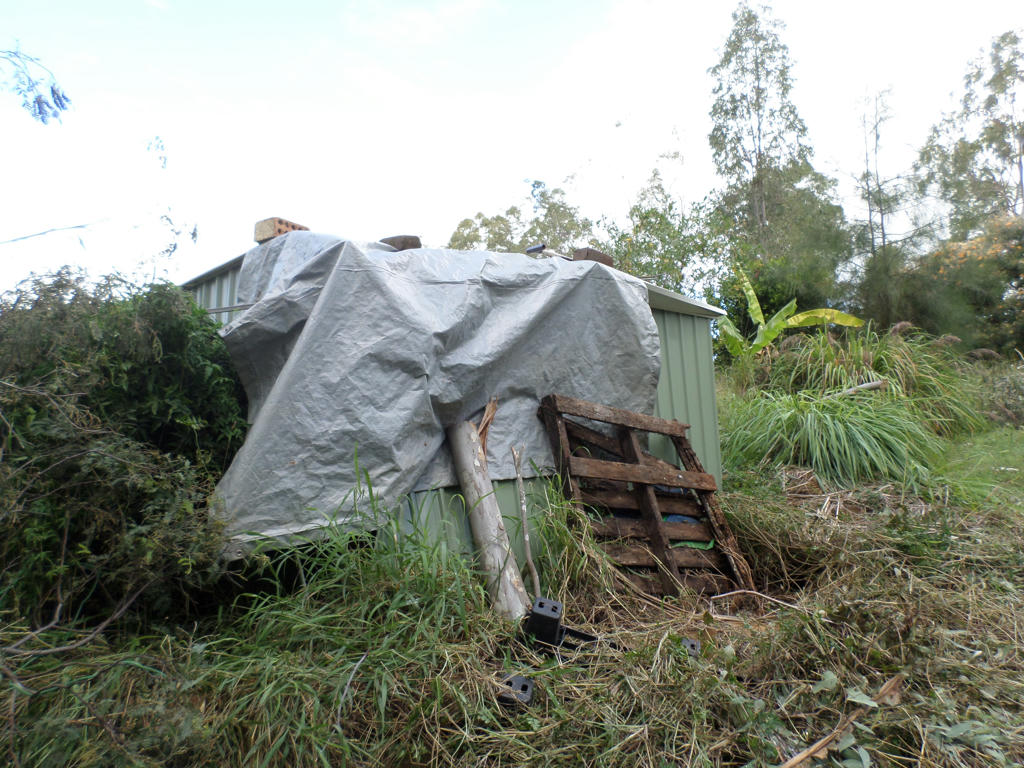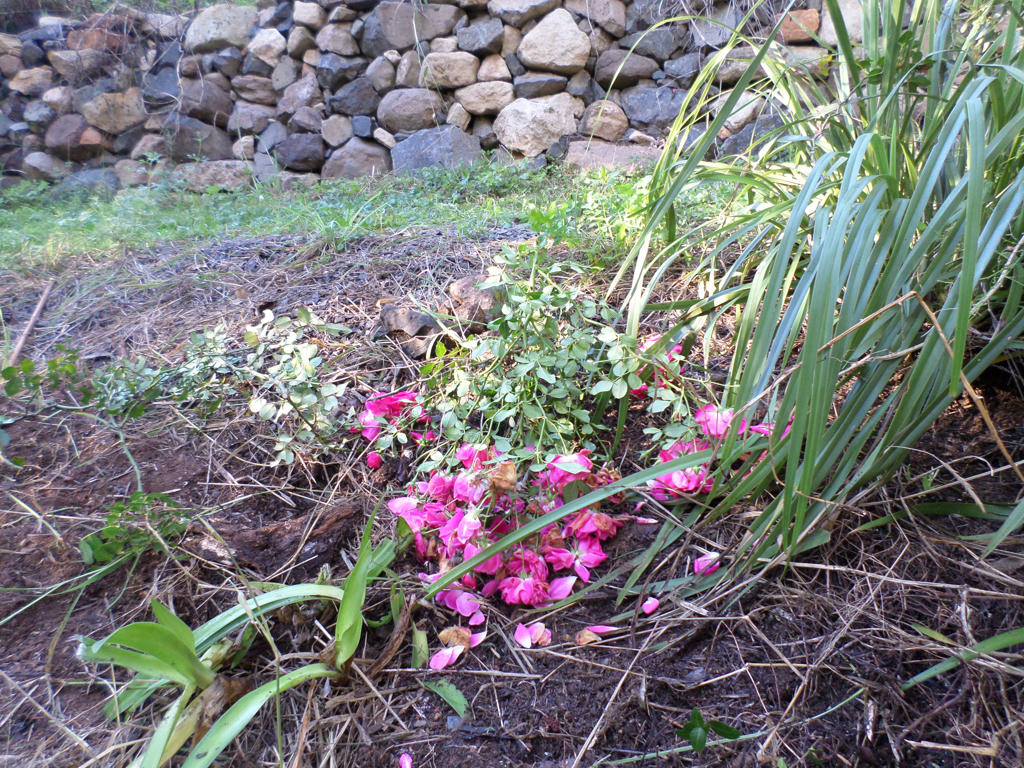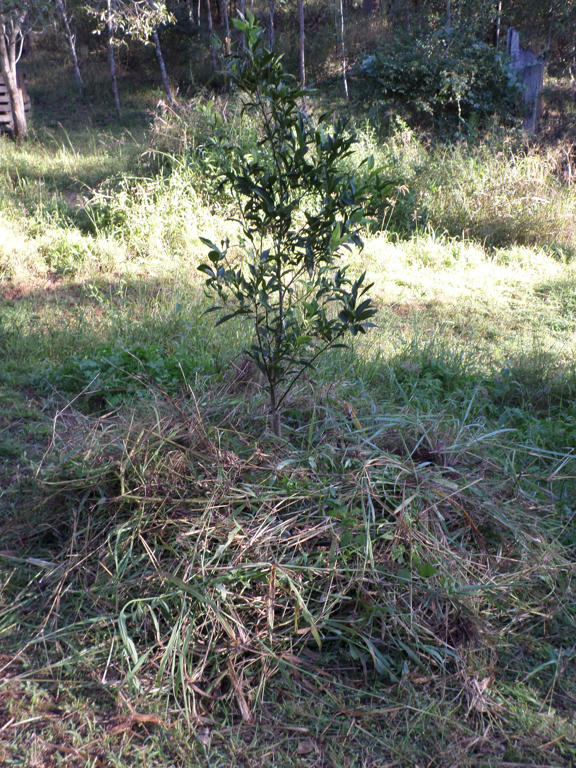So now, this means war...
I didn't have time to take photos of their carnage, as it was a fresh assault, and they probably only had a week to dig their tunnels. I wanted to deal with it straight away. But here is the after picture, of my cleaning up their mess. This was overgrown with long grass, which gives them perfect cover, for digging their network of tunnels.
I'm fairly certain they're native bush rats, not the European variety, as we've seen them occasionally in and around our chicken coops.
They had managed to push out small rocks from our retaining wall, and even pushed over a tennis ball which was probably lost in the garden bed, filled with grass. I first noticed their work, by the giant pile of dirt underneath the wall. I had to try to fill in the holes, both above the wall and in the face of it.
It's not an aesthetic thing which worries me though, its the stability of the wall, and more importantly, when I walked on the bed above, I fell into holes as their tunnels collapsed. That's dangerous, and why they can't stay.
The rats probably started digging these fresh tunnels, after we evicted them from our crushed garden shed.
Did I forget to mention, we had a tree come down on our shed, squashing the gable and popping out the back corner? See all that grass! Perfect cover for bush rats, so a great place to build a nest, or two! It took us 5 weeks to order in a new shed, so they had that time (with us not visiting the shed at all) to set up house.
When I went to look for some paint for my recent weekend project, to rejuvenate the letterbox, that's when I heard them scuttling around. When we pulled out some of the stuff, we found a nest and smelled rat wee. The acidic nature of their wee, even started to eat away at the metal coating on our stand-up shelves.
More on our renovation rescue, in another post, but needless to say, when we evicted their nests and closed up the hole, they went looking for another abode.
So that's how I knew it was a fresh assault. That, and the fact it was fresh soil which didn't have time to dry out in the sun yet. After pulling out all the grass in the bed above the wall, and filling in the holes, I threw some prickly rose prunings, on top, as a deterent. I was fully expecting to see some digging around this morning, but no sign as yet.
I suspect it has to do with the long grass I pulled out of the bed, as it gives them cover from aerial predators (especially owls at night, when the rats are most active). I didn't waste the grass though.
It made excellent mulch for a nearby mandarin tree. I use grass and weeds for mulch, even when they've gone to seed, because its a free resource and anything which does re-grow from seed, is leggy and easily pulled. Besides, I only end up with more free mulch, if anything gets away on me.
Regarding the war on rats though, we don't intend to trap or poison. Just good old-fashioned, pushing them out of our territory. They can have the other 4 acres, just not the areas around the house we visit the most.
Strategies for deterring them includes, pulling out long grass and using our grey water to establish the plants we want to grow. These plants will probably provide them cover too, but will have matted up the soil with the fibres of their roots. Grass tends to have shallow roots they can dig under, so we want plants with more vigorous roots.
Unfortunately, they've also done damage to some of our block retaining walls too.
This is an earlier picture, when we first really used the space above the wall as a vegetable bed. Since its been mostly over grown by grass and only visited occasionally to turn the compost heap, the rats have moved in.
We won't concern ourselves with that area though, until we plan to use it again. Which we will. Right now, we need to get on top of a few projects, like fixing the shed and what to do with all those pieces of sheet metal left over.
More to come.







I feel for you. We used to have them too, but they've moved out, maybe for good or maybe just for now. Native Swamp Rats. They didn't do as much damage to the garden as you seem to have suffered; they mainly stuck to the bush, where they made little runways at ground level and dug deeper breeding burrows. Like you, I found a burrow when the soil suddenly subsided beneath my feet. When they discovered the chook run and coop was when I lost patience. Chook food is too expensive to share with something when I've deliberately fostered a couple of acres of its native environment for it. I had to do major works to seal the base of the coop with wire mesh to prevent them digging up into it and put the food in containers where they couldn't get at it. The chooks used to watch them running around with interest but despite my yelling, "get 'em Girls", they didn't want to chase them.
ReplyDeleteThe introduced rat has a tail longer than its body length, while the native rat's tail is shorter than its body length. Its face is short and blocky, while the introduced rat's is longer and pointy. There are differences in the size of the ears also, but I can't remember what offhand.
They're cute little creatures and nearly extinct in our municipality, so I want them around, but not in my space!
You had them too, huh? We found one dead in our chicken coop once, that's how we knew they weren't European rats. The rooster must have killed it, because since we have just hens now, I haven't seen another dead in the coop like that.
DeleteThey eat anything fruiting or growing in late winter, which is why we think they set up house between our growing areas and our chicken coops. They get a plentiful supply of food and nice areas to burrow near our walls. They're only doing what all critters do, and selecting the prime housing and food estates for their territory, lol. I don't blame them for not wanting to set up in the bush, life's a lot harder there. ;)
I've got a pecan tree I plan to plant on the other side of the gully, in hopes when it fruits, they'll want to set up there instead. But it will always be too tempting on this side of the gully, lol.
No, they wouldn't be welcome here either, but I'm glad you are just pushing them further out and.not damaging their numbers. I wonder how persistent they will be though. I hope it's not a protracted battle.
ReplyDeleteI suspect it will be an entrenched war. ;) Sorry, couldn't help myself. They'll be digging in wherever they can, I'll be flushing them out and they'll go find somewhere else to dig. They don't seem to like human contact, which is why they tend to set up house in areas we don't frequent a lot. I've heard European rats have lost their fear of humans, and aren't as easily persuaded.
DeleteThey'll win, only if I keep off the pressure. Which means we have to take control of the gardens around the house again. We let them go, as opposed to clearing out overgrown grass, as it holds and protects the soil. We have to put in more plants which will out compete the grass. :)
That is not something I find acceptable either. We had some issues for awhile but luckily with barn cats around and also the birds of prey that we see daily, we have it back under control to a degree. However a neighbor just trapped a rat in her basement and so now I have the heebee gee bees. Something more drastic might need to be done around the area.
ReplyDeleteIt sounds like the European rats, if one was found in your neighbours basement. They're quite happy to take up residence in, or near, a house. They can prove difficult to remove completely. That's probably when drastic measures are required. While I don't like the killing of animals, when it comes to maintaining basic safety in a person's dwelling, then a line has to be drawn. Especially if that animal can carry disease.
DeleteWe're fortunate our native rats are a little more shy, and will prefer to avoid human frequented areas.
It was definitely a Euro rat. This neighbor has a weird tunnel that goes to one of her outbuildings from her basement. I know that it seeps water so there are ways in. But it worries me as when I say neighbor I mean right across the road so if she has them, we need to worry.
DeleteThe problem we face with killing varmints like that is that poisons are out. When they eat the poison they end up outside in search of water (hypothetically) before they die as it makes them thirsty. They become easy pray for eagles, hawks and owls but if they are eaten they too are poisoned. What my neighbor did was catch it in a cage and ended up stabbing it. It a very harsh solution no matter how we look at it but disease is a huge worry.
We have another neighbor whose yard is the haven we think and so we will have to do something about this in all seriousness.
Oh dear, that is a problem. There's not a lot you can do, if the breeding ground is on someone else's land. However, preventing them from setting up on your land, will keep the numbers you have to deal with, down.
DeleteThere has been some research in Australia that native rats push European rats out of their territory. Maybe you can enlist the help of some natural competitors? There could be more preferable vermin to have around.
I have always wanted to learn falconry as a hobby but I suspect we'd need a few of birds to take care of the issues. We do have a great population of eagles and other birds of prey so I figure I should encourage that but then they might eat my barn cats so I am a little bit hesitant to encourage what is already there. I will have to look for more information to see what else eats these rats without harming the natural order of things. Snakes?
DeleteThat's funny, because I was thinking initially, what you need is a resident carpet snake (aka: python). That's probably why the rats are out and about (for us) at the moment. It's winter and all the snakes have gone into hibernation.
DeletePS while I have you hear-it could be my recent computer worries but I can't find a follow comments button anymore. Do you see it?
ReplyDeleteUntil you mentioned it, I've never looked for one. But there seems to be a check-box, on the lower right-hand corner of the comments box, with "Notify me" next to it. I wonder if you need to have chosen your "Reply as" handle, before the box appears? That's just a guess.
DeleteHmm….just more mysterious issues on my end to be solved. I suspect that my operating software might have become obsolete in the last few days. Seems like these issues are software ones but I don't have any updates in my queue. I was just wondering if you saw what I saw. It doesn't pop up at all when I post.
ReplyDeleteI'm not sure what you're used to on your browser, but the, "Notify me", check-box, is embedded with the comment form, on the same line as "Publish" and "Preview". When you check the box, a reply comes up "Follow-up comments with be sent to ..." and it puts your registered email on the end. You don't even have to have submitted your comment for this reply to be generated, when you check the box.
ReplyDeleteDo you see the "Notify me" button, and its just not responding when you check the box, or is it, the "Notify me" button doesn't appear at all?
I don't see the notify me button at all anymore. It used to be there before. I also thought you had a " follow me" button but you might have taken it down. I am using Safari but I'll check you on on Chrome and Torch to see if its just Safari which has been buggy lately.
Delete